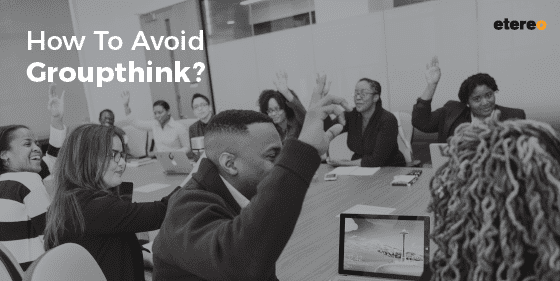How To Avoid Groupthink?

There is a saying, two heads are always better than one. And by that definition, the more heads we have, the better situation we are in. However, is this true? After all, the one big advantage of a group is information aggregation. In organisations, decisions are usually made after rounds of debates and meetings, where studies and ideas are contributed before arriving at an outcome on the solutions and implementations.
While it is in everyone’s interest for discussions and meetings to go smoothly, there is an undeniable fact that the pursuit of harmony or conformity in one’s group can result in a psychological phenomenon known as groupthink. Because of the desire to achieve cohesiveness in a group, people often have the tendency to agree with one another at all costs. This causes the group to minimise all kinds of confrontations and conflicts in order to reach a consensus. However, groupthink can do more harm than good in such an organisation setting. It dampens and restricts creativity, critical thinking, controversies or even a simple debate or rebuttal. More often than not, groupthink leads to irrational outcomes that can cause more harm than good. While there are some good outcomes that stem from groupthink such as efficiency, it is better to avoid groupthink entirely to prevent the possibility of poor decision-making and ineffective problem-solving.

So, how do we identify groupthink? Now that we understand groupthink derives from the desired outcomes of having cohesiveness and harmony within a group, we can start from the leaders. We can observe the type of personalities such leaders possess in order to achieve such a level of group cohesion. These leaders are usually charismatic, strong, authoritative, and persuasive amongst many other qualities. However, we cannot assume groupthink exists just by judging the leaders. Here are some symptoms of groupthink that can be portrayed by the group:
- Peer pressure: Victims of groupthink apply pressure to those who momentarily express concerns or doubts during their group sharing. Therefore, unable to express their own views or arguments.
- Complacency: Relying on past track records; assuming the same methods will always work and therefore, dismissing the notion of embracing new ideas and changes.
- Self-censorship: Victims of groupthink often keep quiet to avoid deviating from the consensus. Doubts and concerns are not expressed as they view this as an uphill battle, and could be seen as to undermine the consensus.
- Illusions of unanimity: Victims of groupthink share an illusion of unanimity – that the majority views and judgements of the group are unanimous.
Cohesiveness is not always good. Although having a united front appears very desirable for an organisation as it can get things done easily and faster, it can also cultivate a very complacent and ‘delusional’ work culture within the organisation. One theory from researchers in the University of Michigan and North-western University’s Kellogg School of Management is that flattery and opinion conformity make leaders overconfident, resulting in biased strategic decision making.
To avoid this undesirable outcome, a culture of open constructive feedbacks and conversations needs to be encouraged. Stakeholders should take pride and ownership in the decision-making process. There is always a need for someone to play the “Devil’s advocate” and embrace conflicts as part of the decision-making process. Only with effective criticisms and acceptance of harsh truths can there be real progress and developments.

In an organisation where opinions from the bottom-up are considered, the management can open the floor for unrestricted personalised answers instead of signalling their preferred outcomes from the onset. Any form of signalling may subconsciously influence the thought-process of others, especially for non-managerial employees. And for such strategies to work on the management level, it needs to be made up of competent leaders in the first place. Encouraging positive criticisms can only work if they have the capabilities to manage it well. Otherwise, it may become a double-edged sword.
Apart from cultivating the right culture to avoid groupthink, seeking help from external members such as third-party consultants can also help prevent groupthink. An impartial opinion can provide fresh perspectives that the management may have overlooked due to the lack of knowledge or expertise.
If your company has ever considered the possibilities of upscaling internal capabilities, why not speak to a certified consultant to get new perspectives on your existing business strategies. Prepare yourself for the next economic upturn by reaching out to us on how we can help SMEs to identify their business gaps. You can also embark on transformation projects under the EDG programme through certified consultants like us, with grants of up to 90% by Enterprise Singapore.